You need a week to taste what this magical island has to offer. On second thought, eight days. No country can boast as many cultural attractions devoted to food. Plus Celebration Traveler Guide Cultural Travel: Taiwan.
By Donna Peck
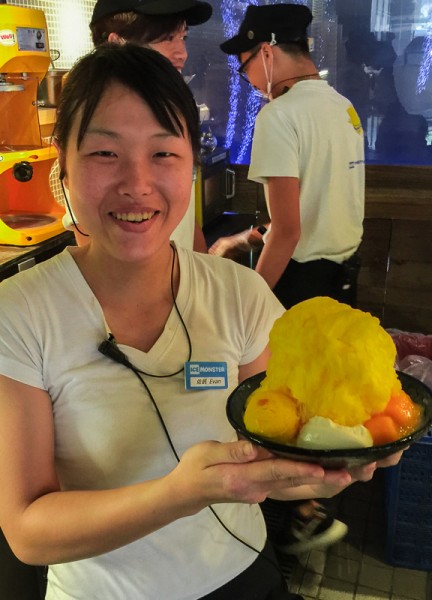
As a child, the world began at the edge of my driveway. I absorbed all I could from my family’s twenty-volume Books of Knowledge. I imagined the empires of Asia as places of ancient treasures and modern wonders. I traveled to Taiwan for the first time last summer, but when I checked into my hotel, I was in a foul mood from the lack of sleep.
I unlatched the hotel window but it only opened a few inches. The spire of Taipei 101, nearly a half-mile tall, flashed silver in the sun. The rest of this grand sight lay under a thick dull haze. I had traveled ahead of my group to have a free day, but finally amid the wonders of Taipei, all I wanted to do was sleep. I felt like I was in the wrong time, the wrong life. The hope that I carried on the plane, that always travels with me to new destinations, is that my taste for life would come charging back. Perhaps things would look differently if I stayed awake; then I would sleep through the night and get a start fresh the next day.
I glanced below to the warren of rooftops behind the hotel. It was 7 a.m. The battle to stay awake had begun. I grabbed my bag and left the hotel.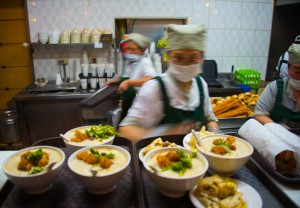 For the next hour I poked along the narrow lanes. The apartments were silent and the storefronts padlocked. Huashan Market hadn’t opened, but the food hall on the second floor was packed with city workers, hotel maids, taxi drivers and a scattering of tourists.
For the next hour I poked along the narrow lanes. The apartments were silent and the storefronts padlocked. Huashan Market hadn’t opened, but the food hall on the second floor was packed with city workers, hotel maids, taxi drivers and a scattering of tourists.
At the food hall
I sat down at an empty table. The assault of sounds and smells left me reeling. Behind glass, women in long white aprons and white boots worked non-stop replenishing the deep-fryers and ovens. Strips of bread dough sizzled in hot oil. Thin squares of dough coated in sesame seeds baked in clay ovens. At the counter, a half dozen women in green aprons bantered and filled orders, wrapping deep-fried doughnuts in flatbread, their hands in constant motion.
I got in line. When it was my turn, the counter lady beamed at me, asking in Chinese I guessed, “What can I get for you?” Her sing-song voice lifted my spirits. I forgot that I was weary to the bone. I pointed to the doughnut wraps on the table behind her, saying “One please,” holding up a finger. “Yóutiáo shāobǐng,” she yelled over her shoulder. “Do you want anything else?” she asked in Chinese. I shook my head. I nibbled at the flatbread wrapper, then bit into the doughnut. The food hall became a blur. How satisfying the crunch of the crispy crust. How light and airy the inside, I felt like I was adrift on a cloud.
At the crosswalk
Back outside, the street led to Zhongxiao East Road and the whoosh of rush hour. It was 9 a.m. Scooters and motorcycles zigzagged across eight lanes of traffic, the drivers swerving around buses and vans, their passengers swaying, most of them talking on cell phones. The traffic light turned red. Yamahas, Hondas and Suzukis slammed to a halt like wasps hitting a wall.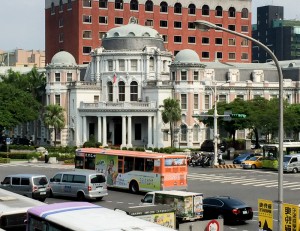
The scene was as chaotic as my mental state. I was probably the only one in a one-mile radius who had no place to go. The light flashed green and the whining posse shot past. I didn’t move. Taipei’s boulevards are laid out on a compass. Minimal danger of getting lost, I thought. I kept wandering to stay awake, putting one foot in front of the other, staring blankly at shop windows. It was getting harder to keep out of the way of the mid-morning shoppers flooding Songshan District. A lane appeared off Fuxing South Road and swallowed me whole.
Compared to the boulevards, Taipei’s back streets are so tranquil, you can hear birds singing. I sat down on a bench under a leafy tree. It was 11 a.m. Narrow four-story apartment buildings surrounded the park. Clotheslines, elephant-ear plants and plastic coolers jammed the balconies. Tight quarters, I thought. Voices drifted from the foot-massage parlor across the street. The business doubled as a gathering spot for neighbors who stopped by to share a pot of tea and smoke cigarettes.
At the foot-massage parlor
Why not, I thought. A foot massage would take the edge off my jet lag. And buy me an hour in my battle to stay awake. I got up and crossed the street. The young woman at the register took my money and motioned toward a black naugahyde lounger. Her mother, I’m guessing, approached me with a tub of sudsy water, and said in Chinese, “Soak your feet.”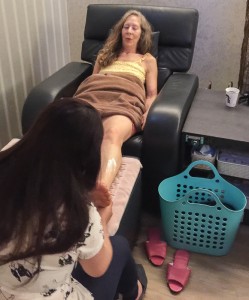
I felt docile, comfortable and closed my eyes. I awoke with a start, wincing. The masseuse pressed her thumb on the hollow beneath my ankle. “Yeow,” I gritted my teeth, fighting the urge to jump out of the chair. She grinned and applied more pressure, then massaged pressure points along my feet and calves. What had I gotten myself into? She gestured for me to relax, cooing to me in Chinese. She inhaled slowly, deeply; pointing for me to do the same. If I had dropped acid, this would be the bad part of the trip.
I stood in the bright afternoon sun feeling raw and vulnerable. Temperatures were climbing and I noticed sweat dripping into my ears. At a sidewalk kitchen, jet burners were cranked on high. Noodles roiled like sea grass in a surge in boiling kettles. Judging from the line on the sidewalk, 90 degree temperatures didn’t put the Taiwanese off their beef noodle soup.
At the ice palace
At 1 p.m. the sight inside a shop window glued me to the spot. A block of glistening mango ice whirled around a spindle. A young man in the black and white Ice Monster uniform caught the falling slivers of ice into a bowl. For the first time that day, my body wanted something more then sleep. I pushed open the door.
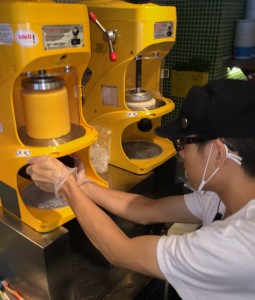 Holding the icy bowl in my hands, I had a mind-altering experience. The skin on my hands and face cooled as I examined the fruity frosty mango shaved ice and mango ice cream mounded on ripe, sweet diced mangoes. Time stopped. This icy confection surpassed any pleasure I can recall from a dessert.
Holding the icy bowl in my hands, I had a mind-altering experience. The skin on my hands and face cooled as I examined the fruity frosty mango shaved ice and mango ice cream mounded on ripe, sweet diced mangoes. Time stopped. This icy confection surpassed any pleasure I can recall from a dessert.
The thrill lingered for an hour.
I left Jianguo North Road and headed into a maze of narrow lanes. It was 3 p.m. I felt I had turned a corner in my efforts to acclimate to this new time zone. I stopped at the corner, curious about the ceremony taking place at the green grocers. Buddhist monks in saffron robes were chanting, waving bundles of glowing-red incense giving off a musky, woodsy smoke. A crowd was gathering. I stood at the front and inhaled the intoxicating wisps. If I were a fly, I’d nest in Confucius’ beard and go to sleep.
At the teahouse
When I came out of the trance, I was in front of small wooden house with a cobblestone patio on Xinsheng South Road. The Japanese-style tea house had the languid air of a previous century. I sat at a table in one of the back rooms. It was 4 p.m. and I lost all sense of what time it was according to my body clock. 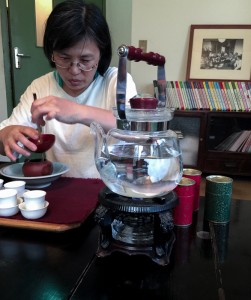 I wanted nothing more than for the day to end and to go to sleep. I thought of the hotel bed that I had been denying myself all day.I glanced at the tea menu. I read the few paragraphs on the back. The Japanese built Wistaria Huse in the 1920s as a home for high-ranking officials who ran the colonial government.
I wanted nothing more than for the day to end and to go to sleep. I thought of the hotel bed that I had been denying myself all day.I glanced at the tea menu. I read the few paragraphs on the back. The Japanese built Wistaria Huse in the 1920s as a home for high-ranking officials who ran the colonial government.
Later under martial law, wooden lockers were installed along the wall when Wistaria House became temporary barracks for Chiang Kai-shek’s soldiers. When the military leader passed in his cavalcade, the police stopped traffic and forced people to salute. I felt weepy thinking about the Taiwanese who dreamed of freedom for 49 years. But I was really weeping for myself, dreaming for 49 hours of sleep.A Chinese woman delivered a tea tray with sweets and a glass kettle. I steeped, strained and sipped the tea, savoring my triumph. I relaxed, only a few hours from drifting into sweet oblivion.
The next day, fully recovered, I launched into the planned agenda. At the end of the trip, I discovered that the sensory experiences of the first day came back with piercing clarity. The details of subsequent days did not pop into my mind with the same color and brilliance. On my next trip I wouldn’t avoid jet lag. I’d just stay in the altered state, ride it out. Even look forward to it.
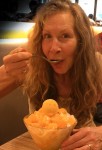 —photography and text by Donna Peck
—photography and text by Donna Peck
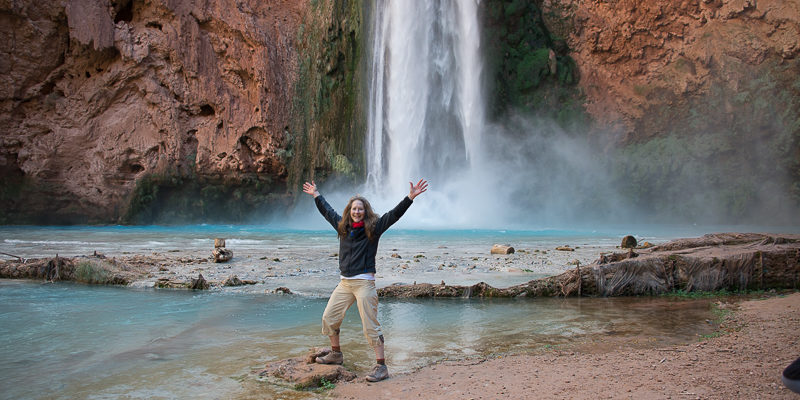
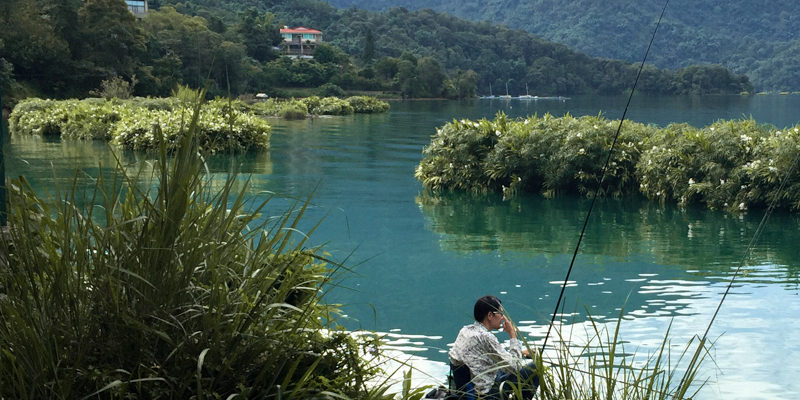
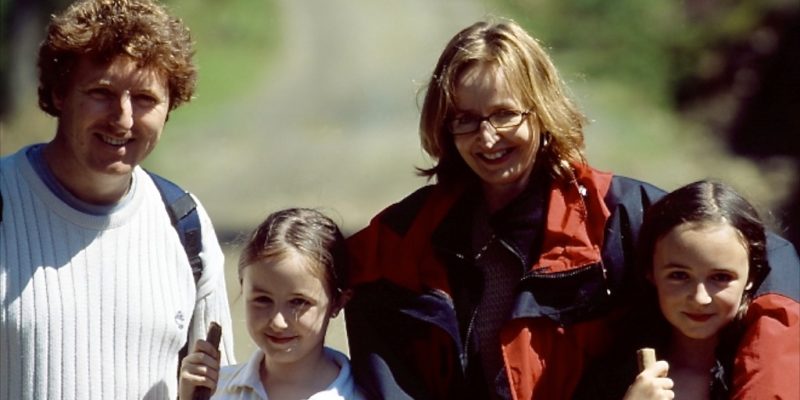
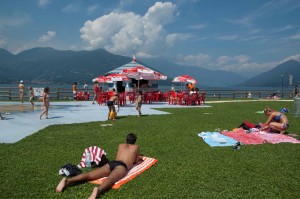
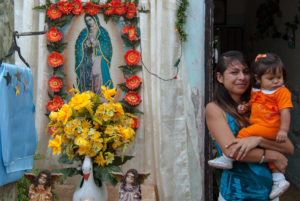
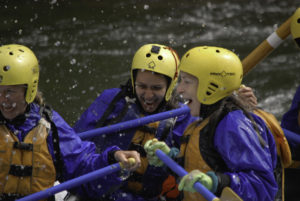
Leave a Reply